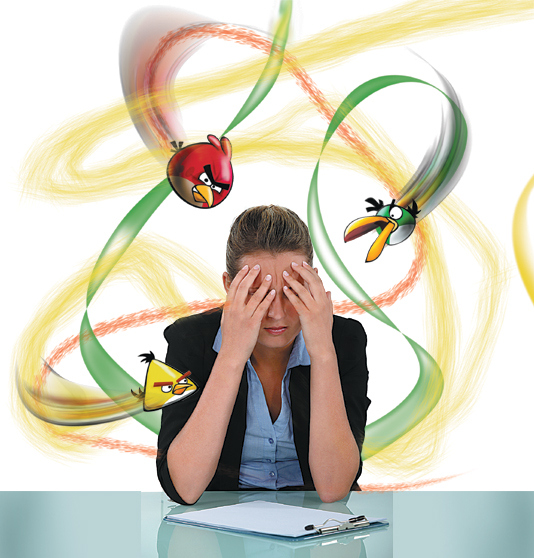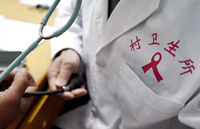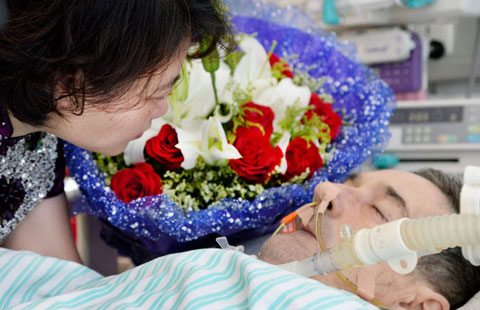That spinning feeling
By Liu Zhihua (China Daily) Updated: 2012-12-02 09:54Dizziness is often attributed to tiredness, but it can be the forebear of more serious illnesses, as Liu Zhihua finds out from a panel of experts.
It is often regarded as a symptom more than as an illness itself - and therein lies the difficulty of diagnosis.

When patients suffering from giddiness consult a doctor, they may not get an instant answer because dizziness can be caused by a multitude of medical conditions, including stroke, sudden deafness, cervical spondylosis, depression and anxiety, among many others.
But, it is still important to get a proper diagnosis because being giddy all the time can be very debilitating, especially for the elderly, and affects the quality of life.
Sometimes it can even be life threatening, when it results in falls and fractures.
It is such a common and puzzling complaint that a group of experts gathered at Beijing's China-Japan Friendship Hospital recently to examine the issue and seek solutions.
According to Li Zhongshi, director of the hospital's orthopedics department, 8 percent of the Chinese population suffers from dizziness.
Among women older than 65, the occurrence rate is 57 percent, and among men of the same age, it is 39 percent.
Also, more and more young people are reporting that giddy feeling, Li says.
Tang He, a 21-year-old Chinese studying in the United States, says she used to have panic attacks when she got giddy. She suffered neck aches, to which she did not pay much attention because she had always had migraines.
In April, she started getting vertigo and the strange sensations became more intense. She went to her college doctor and got an X-ray but failed to get a satisfactory diagnosis.
During her summer vacation back home, she went to an orthopedist and finally got diagnosed as suffering from cervical spondylosis - a condition caused by the degeneration of the cervical vertebrae.
Jiang Zidong, an otolaryngologist who deals with ear, nose and throat health problems at the Peking Union Medical College Hospital, agrees that patients should insist on a proper examination.
"They should go to a doctor for an accurate diagnosis at the first attack, especially when they are unsure of the cause.
But, there are so many possibilities that, even for doctors, it is hard to make a correct diagnosis, Jiang says.
In Jiang's hospital, dizziness accounts for about a third of all clinical visits, and the symptom is also the number one reason why the elderly are sent to the emergency room - far more than for strokes and headaches.
Patients generally fall into two categories, Jiang says.
One group consults him directly because they are dizzy and suffering from tinnitus, a condition where the patient has persistent ringing in the ears.
The other, the larger group, consists of those who have symptoms such as nausea and have already undergone through treatment in various departments, without being cured or even diagnosed.
One of his patients was a 70-year-old man who felt dizzy and nauseous whenever he turned over on his left side in bed.
His family sent him to the emergency room, fearful that it could be a stroke.
It was not a stroke, but there was no clear diagnosis, and the old man went through various checks and tests in the neurology, otolaryngology, and orthopedics departments in many hospitals.
He finally came to Jiang and was diagnosed with benign paroxysmal positional vertigo (BPPV), a condition caused by faulty nerve signals sent by the dislodged otolith, a sensory organ in the middle ear that is part of a system that senses gravity and linear movements.
Liu Bo, another ear, nose and throat specialist at Beijing Tongren Hospital, says the differences in intensity and duration of the giddy spells, coupled with the appearance of other symptoms, will help doctors decide what causes the dizziness.
For example, if one feels only vertigo or a fear of falling, the problem is probably in the ear.
If there are also symptoms of headaches, double vision, numbness in the limbs and so on, the underlying condition is probably in the nervous system.
If the patient feels dizzy only when he turns his head at a certain angle, he is probably suffering a problem with his inner ear.
But if he is dizzy whenever he turns his head, no matter which angle, then it is probably something wrong with his cervical vertebrae.
"Most patients come to the department of neurology first. We cannot say this is wrong, because dizziness is linked with stroke and can be very dangerous," says Chai Bin, a neurologist with Beijing Tiantan Hospital, a leading neurological center in China.
Chai says about 15 percent of her patients suffer dizzy spells.
Among them, many more senior patients are likely to have cerebrovascular diseases, when the body cannot function properly due to a faulty blood supply to the brain, like in hypertension.
Most younger patients who complain of being giddy, however, are suffering from depression or anxiety.
"In China, there are hospital departments specializing in pain, but there is no department dealing with dizziness," says Li Zhongshi, director of the orthopedics department at the China-Japan Friendship Hospital, Beijing.
So while it is still very much a hit-and-miss process in the diagnosis of one of the most common symptoms to afflict patients, the ultimate advice is still to seek treatment early, and not to dismiss the dizziness as mere inconvenience that may go away on its own.
Contact the writer at liuzhihua@chinadaily.com.cn.
- Li: Piraeus to become 'top-level' gateway
- Response to 'fully depend' on Manila
- 14 new satellites in orbit will help warn of disasters
- 186 people dead in heavy rains
- Second Yangtze warning issued on flooding peak
- Anti-corruption battle set to be intensified
- Bus arsonist gets death penalty in China
- China on orange alert for rainstorms
- Lhasa rail celebrates first decade
- Animals aiding quake detection










